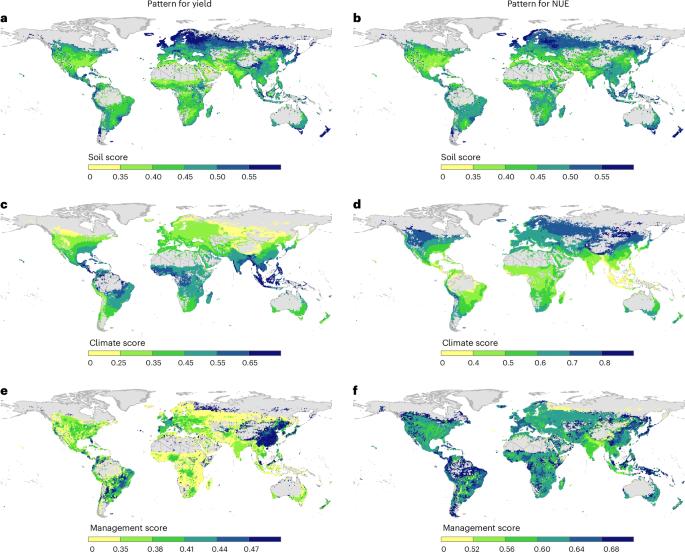Soil health contributes to variations in crop production and nitrogen use efficiency
IF 21.9
Q1 FOOD SCIENCE & TECHNOLOGY
引用次数: 0
Abstract
Soil health affects both food production and environmental quality. However, quantifying its impact poses a substantial global challenge due to the scarcity of comprehensive soil health data and the complexity of disentangling its effects from other variables. Here we integrate high-resolution global data on soil, climate and farm management practices to assess the contribution of soil health to agricultural productivity. We show that soil health is responsible for approximately 12% and 22% of global variations in crop production and nitrogen use efficiency, respectively. While the influence of climate on crop yields is comparable to that of soil health, it is substantially overshadowed by the role of agricultural management, which accounts for roughly 70% of the global yield variation. In regions such as China, India and the central United States, the influence of soil health on crop yields and nitrogen use efficiency is less pronounced due to the dominant effects of farming practices, including the intensive use of fertilizers. Enhancing global soil health could increase crop yields by 7.8 Mt while reducing nitrogen surplus by 8.1 Mt worldwide by 2050. It is crucial to achieve global sustainable development through managing soil health beyond traditional agricultural practices and climate adaptation. The role of soil health in crop productivity and environmental sustainability is often overlooked. Using a 0.5° × 0.5° global dataset, this study shows that soil health accounts for 12% of yield variation and 22% of nitrogen use efficiency variation. Enhancing global soil health could increase yields by 7.8 Mt and cut nitrogen surplus by 8.1 Mt by 2050.


土壤健康有助于作物产量和氮利用效率的变化
土壤健康影响粮食生产和环境质量。然而,由于缺乏全面的土壤健康数据以及将其影响与其他变量分开的复杂性,量化其影响构成了一项重大的全球挑战。在这里,我们整合了关于土壤、气候和农场管理做法的高分辨率全球数据,以评估土壤健康对农业生产力的贡献。研究表明,土壤健康分别对全球作物产量和氮素利用效率的变化负有约12%和22%的责任。虽然气候对作物产量的影响与土壤健康的影响相当,但它在很大程度上被农业管理的作用所掩盖,而农业管理的作用约占全球产量变化的70%。在中国、印度和美国中部等地区,土壤健康对作物产量和氮利用效率的影响不太明显,因为主要影响是耕作方式,包括大量使用化肥。到2050年,加强全球土壤健康可使作物产量增加780万吨,同时减少810万吨的全球氮过剩。在传统农业做法和气候适应之外,通过管理土壤健康实现全球可持续发展至关重要。
本文章由计算机程序翻译,如有差异,请以英文原文为准。
求助全文
约1分钟内获得全文
求助全文

 求助内容:
求助内容: 应助结果提醒方式:
应助结果提醒方式:


